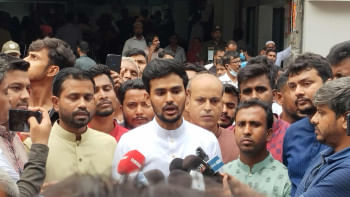Last prosecution witness cross examined
An investigation officer of a war crimes case against Ali Ahsan Mohammad Mojaheed yesterday said the East Pakistan Islami Chhatra Sangha had addressed Al-Badr men at their headquarters even two hours before the surrender of the Pakistan army on December 16, 1971.
Mojaheed was the Chhatra Sangha president from October till Victory Day in 1971, Abdur Razzaque Khan, the investigation officer, said while testifying at International Crimes Tribunal-2 on April 2.
The accused also directly took part in genocide and other crimes against humanity “as the Al-Badr commander” during the Liberation War, he told the tribunal on March 28.
Al-Badr, a notorious auxiliary force known especially for orchestrating the killings of intellectuals before liberation, was formed with the leaders and activists of Chhatra Sangha, the then student wing of the Jamaat-e-Islami, according to the prosecution documents.
The 17th and last prosecution witness in the case, Razzaque made the disclosures before Tribunal-2 during his cross-examination for the fourth day yesterday.
At one point in his four-hour cross-examination, Mojaheed's counsel Syed Mizanur Rahman asked Razzaque questions over “Al-Badr”, written by Selim Mansur Khaled, which was a prosecution document.
“Was the writer of Al-Badr Bangalee?” asked Mizanur and Razzaque replied that he was a Pakistani national.
“Was he [the writer] in Bangladesh in 1971?” asked Mizanur. Razzaque replied, “I don't know.”
Replying to another question, Razzaque said the book was originally published in Urdu and a Dhaka University teacher had translated it into Bangla.
“Is there anything specific in the book about the leaders of Al-Badr in different areas?” asked Mizanur.
The book mentioned the names of the commanders of three Al-Badr groups which were responsible for Dhaka, responded Razzaque.
“Is there any reference in the book that Ali Ahsan Mohammad Mojaheed was involved with Razakar [another auxiliary force of Pakistani army]?” asked Mizanur.
“He [Mojaheed] was not a Razakar. However, on pages 135-136 of the book, the condition of Al-Badr forces on December 16, 1971 was narrated. East Pakistan Islami Chhatra Sangha Nazem [president] addressed the Al-Badr men, which was also narrated there,” said Razzaque.
He also read out the specific parts of the book before the court.
During his testimony on April 2, Razzaque said he had learned from witnesses' statements and documentary evidence that Mojaheed was the president of Islami Chhatra Sangha of Faridpur district in between 1968-1970.
He was the president of Chhatra Sangha's Dhaka city unit in January-July 1971 and became the general secretary of its East Pakistan unit in July 1971 and was the president from October to December 16, 1971.
Razzaque replied in the negative when Mizanur asked him whether the book mentioned any source about the address of the East Pakistan Chhatra Sangha president.
Mizanur Rahman also questioned him about some other prosecution documents.
The three-member tribunal led by Justice Obaidul Hassan with members Justice Md Mozibur Rahman Miah and Judge M Shahinur Islam recorded his cross-examination before adjourning the case proceeding until today, when Razzaque is set to face further cross-examination.
The Jamaat secretary general is facing seven charges of crimes against humanity, including conspiracy to kill intellectuals during the war.
SQ CHOWDHURY'S CASE
A physician yesterday testified that he had provided treatment to Salahuddin Quader Chowdhury in the last part of September 1971 when the latter was admitted to Chittagong Medical College Hospital with serious injuries.
AKM Sofiullah, who was an assistant registrar of CMCH in 1971, told the International Crimes Tribunal-1 that he had seen army and policemen when Salauddin was admitted to the hospital at night.
Earlier, two prosecution witnesses in Salahuddin's case testified that they had conducted an operation to kill Salahuddin in September 1971. Salahuddin survived with serious injuries and his driver was killed in the attack.
Sofiullah, the 27th prosecution witness from Chittagong, said after passing MBBS he had joined CMCH as an institution trainee on July 27, 1970 and after the training period joined the hospital as an assistant registrar.
In the last part of September 1971, around 10:00pm, Sofiullah got a “call message” from the hospital and after 30 minutes, when he reached the hospital, he found many people there, among whom were soldiers and policemen.
“I saw Salahuddin Quader Chowdhury bed-ridden in my room with serious injuries. As far as I can remember, he [Salahuddin] had received injuries in his leg and I had given him necessary treatment,” said Sofiullah.
After three to four days, he had heard that Salahuddin had been taken to another place for better treatment, the witness added.
On August 28, 2012, two freedom fighters -- SM Mahbub-Ul-Alam and Qazi Mohammad Nurul Absar -- said they had conducted the operation to kill Salahuddin together as he was “killing and torturing people” with the help of the Pakistani army and their collaborators.
They testified that they along with two other freedom fighters had launched an attack on Salauddin in September when the latter was coming out of a house in his car.
After Sofiullah's testimony, Salahuddin's counsel Ahsanul Huq Hena completed his cross-examination before the tribunal led by Justice ATM Fazle Kabir adjourned the proceedings until today.
BNP lawmaker Salahuddin Quader Chowdhury is facing 23 charges of crimes against humanity committed during the Liberation War.

 For all latest news, follow The Daily Star's Google News channel.
For all latest news, follow The Daily Star's Google News channel. 



Comments